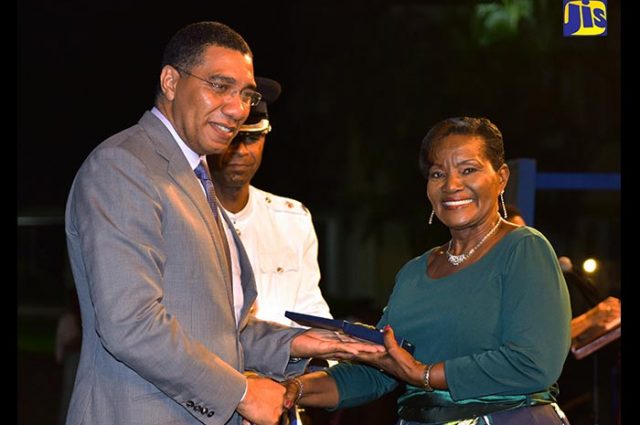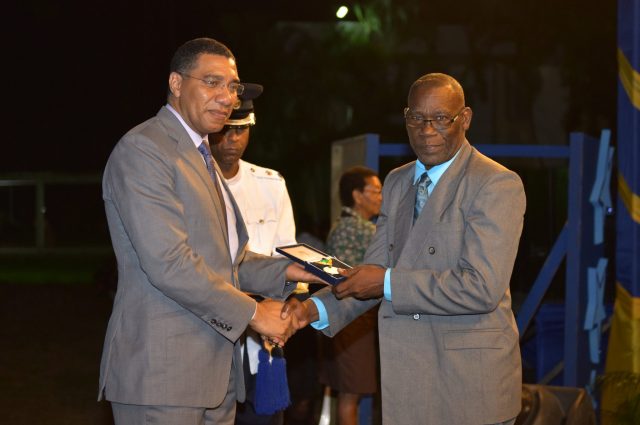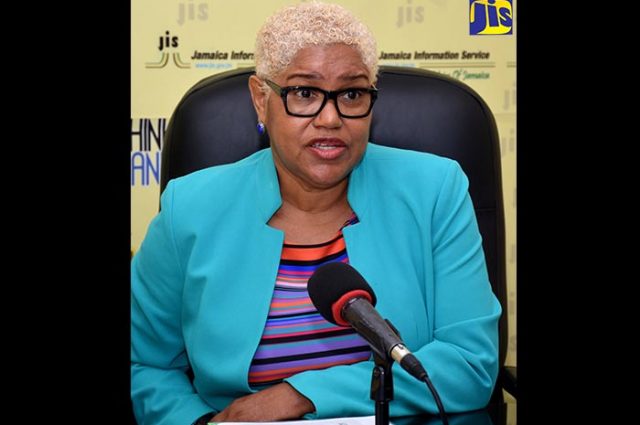JIS: Recipient of the Prime Minister’s Medal of Appreciation for service to Education, Mrs. Isoline Brown-Budhoo, says that her journey of more-than 40 years in the teaching profession happened as a result of a short-lived love affair with nursing.
Speaking with JIS News, the retired Vice Principal says she realised she was destined to teach, after a one-year stint at nursing school proved futile and took her back to a career that she describes as “one of the most gratifying professions”.
“I started out as a pretrained teacher at Wood Hall All-Age School in 1970 in my home parish, Clarendon, then left and went to Kingston School of Nursing, but realised I did not have the guts for nursing, and so, I returned to teaching and never looked back,” Mrs Brown-Budhoo says.
On her return, she taught at the Mount Providence All-Age School in Clarendon before journeying to Church Teachers’ College to pursue studies in primary education.
While at college, her love for the profession grew, and as she gained experience through teaching practice at the Christiana Leased School in Manchester, she knew that, without a doubt, teaching was where her true passion lies.
On full completion of her studies, she returned to Clarendon and accepted a job at the then Denbigh Secondary School, where she taught from 1977 to 1979.
September 1979 saw her venturing to May Pen Primary, where she remained until she retired in 2012.
During this period, she served as senior teacher, acting Vice Principal and was appointed Vice Principal from 2009 to her retirement.
“I started a 33-year journey here…it was challenging, but also exciting, and I did everything in my power to enhance the reputation of the school,” Mrs. Brown-Budhoo says.
“When I went to May Pen Primary, I taught grade four for two years, then the principal decided to move me to grade six due to my ability to manage that age group and the volume of work to be done to prepare the students for the Common Entrance Examination, and within the year, I was also promoted to senior teacher,” she adds.
She says her job felt most rewarding when her children succeeded, and this propelled her to being even more committed and dedicated to serve.
“I initiated a lot of programmes in the school… . They did not have a house system in place, and so I introduced a house/sport system using the names of past principals, and the school came alive on sports day and there was camaraderie, good sportsmanship and teamwork,” she says.
She adds that the house/sport system prepared the school to participate and dominate several parish, regional and national competitions, while producing top athletes who went on to excel at the high-school and tertiary levels.
Another initiative that she introduced was the Spelling Bee Club, which sparked competition among the various grades at the school.
“We used to have an organised ‘spell down’ at the end of the month, and we did our own inter-school spelling competition, which enhanced reading and comprehension and also resulted in the school winning parish competitions and advancing to the National Spelling Bee competition for several years,” she reflects.
Mrs. Brown-Budhoo also spearheaded an extension class at the school to prepare students for entry into the HEART/NTA programmes.
“We would teach these extra classes after school, to help children who applied for HEART but failed mathematics and English… so myself and a team at May Pen Primary would teach them for a year and prepare them to resit the test, and we had 100 per cent passes for five years,” she boasts.
These projects were in addition to the 4-H Club, Cub Scouts, and beautification, which she also spearheaded.
“It was hard work, but I enjoyed the challenge and loved spearheading the various projects, as there was an abundance of joy and accomplishment when the students succeeded, and this was proof that the hard work that I committed to doing truly paid off,” she asserts.
“Teaching is one of the most gratifying professions… . When you go out and you meet your past students and they greet you and tell you thanks for not giving up on them… [and] when they hug you and tell you how much they appreciate the way you helped to mould their lives, it is extremely gratifying,” she expresses.
Mrs. Brown-Budhoo was also an active member of the Jamaica Teachers’ Association (JTA) and spearheaded several projects within the May Pen community.
She served as President of the Clarendon Teachers’ Association and member of the Central Executive of the JTA.
“I was a very active member of JTA, and as president I visited all 26 schools in the parish to inform the teachers of their rights and responsibilities. At the community level, I would have classes with persons in the area who could not read… . I would collect food, clothes and other basic items and distribute to children’s homes, infirmaries, nursing homes and to the homeless,” she tells JIS News.
Her service to community and the teaching profession has resulted in her being recognised and awarded on several occasions.
Included among the awards are the JTA Golden Torch award, for 37 years of service; the JTA Clarendon Parish 40th Anniversary award in December 2005; the JTA South Central Region award; Kingston Bookshop award in 2001; and a special award from the May Pen Primary School for her invaluable contribution.
She adds that she felt quite honoured, and grateful on receiving the Prime Minister’s Medal of Appreciation for Service to Education.
“This recognition is now the icing on the cake… . I am very happy for receiving this prestigious award and for getting it while I am alive,” she says.
Her advice to those currently in the profession is to “be there for your students, help them to be the finest individuals… . It may be quite challenging, but somebody has to be there to do it, and if you choose to do it, give it the full 100 and you will get your reward in the long run”.
“Teachers do not only teach but they also have to be role models; they have to live a certain way, as they are looked up to in their communities, and, through their actions, children learn and understand how to become good citizens, so they have to lead by example,” she appeals.
Even though retired, Mrs. Brown-Budhoo continues to serve and to empower those around her.
“I want to establish a centre and offer remedial, literacy, numeracy classes and empowerment sessions. There are some persons who would have graduated but did not do so well and tend to be withdrawn, so I want to help build their self-esteem, empower them and let them know that they are loved and that they can be somebody of worth and make a valuable contribution to society,” she shares.
CAPTION: Prime Minister, the Most Hon. Andrew Holness, presents former Vice principal of the May Pen Primary School, Mrs. Isoline A. Brown-Budhoo, with the 2018 Prime Minister’s Medal of Appreciation for Service to Education at the awards ceremony held on June 27 at Jamaica House.











